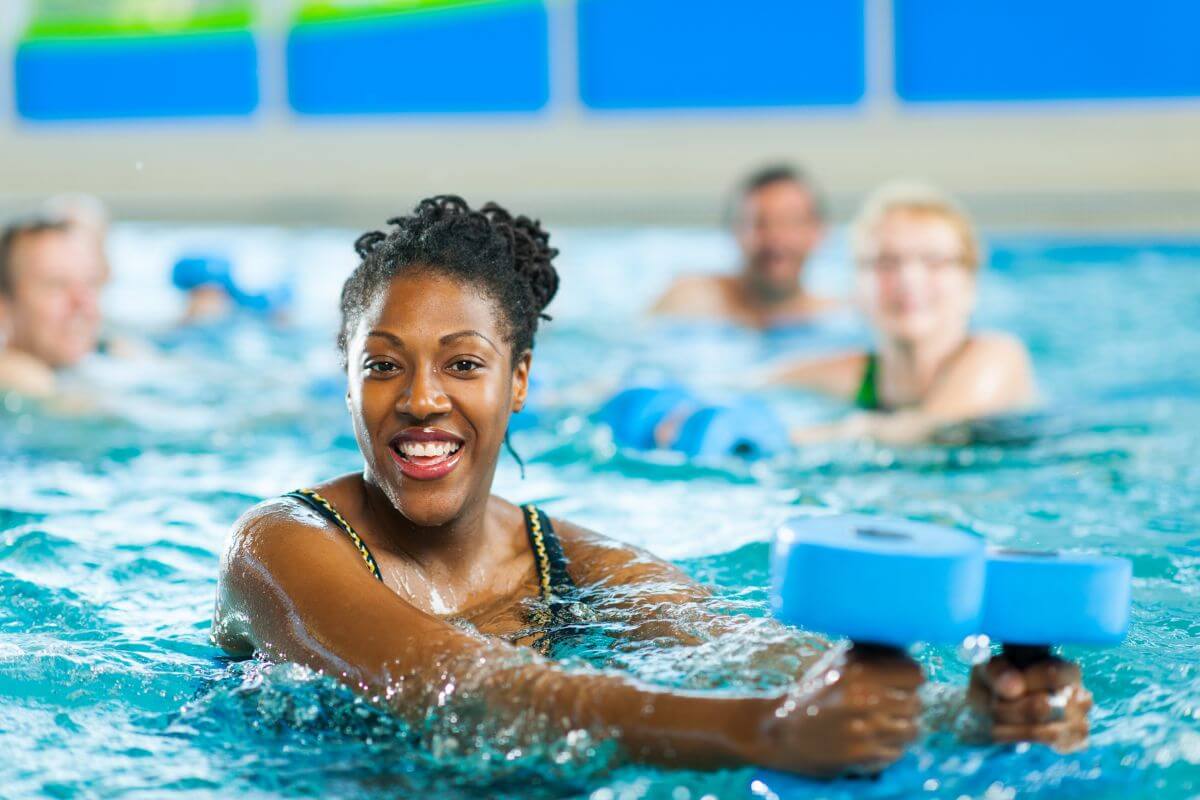10 Best Health Benefits of Swimming for Seniors
As older adults embark on the journey of aging gracefully, maintaining a healthy and active lifestyle becomes increasingly vital. One of the most enjoyable and effective ways for seniors to stay fit is through swimming and aqua exercises. Beyond the refreshing sensation of water — especially warm water indoor pools — swimming offers an array of benefits that cater specifically to the unique needs of aging bodies.
For example, regular water activities help improve energy levels, stiff joints, poor balance, and even social connections. It also helps improve muscle strength, joint pain, blood flow, and heart health. Who would ever have thunk the water would have so many health benefits? You can certainly get a great workout in the water! So let’s explore the ten most significant benefits of swimming for seniors.

Key Takeaways
- Aqua exercises and swimming are believed by many to be the best form of exercise for older adults because of the many health benefits.
- Beyond the physical health benefits, there are social and mental health benefits for seniors, as well.
- There are many forms of exercises that seniors can do in the water where there is a reduced risk of injury and falls because of the buoyancy of the water.
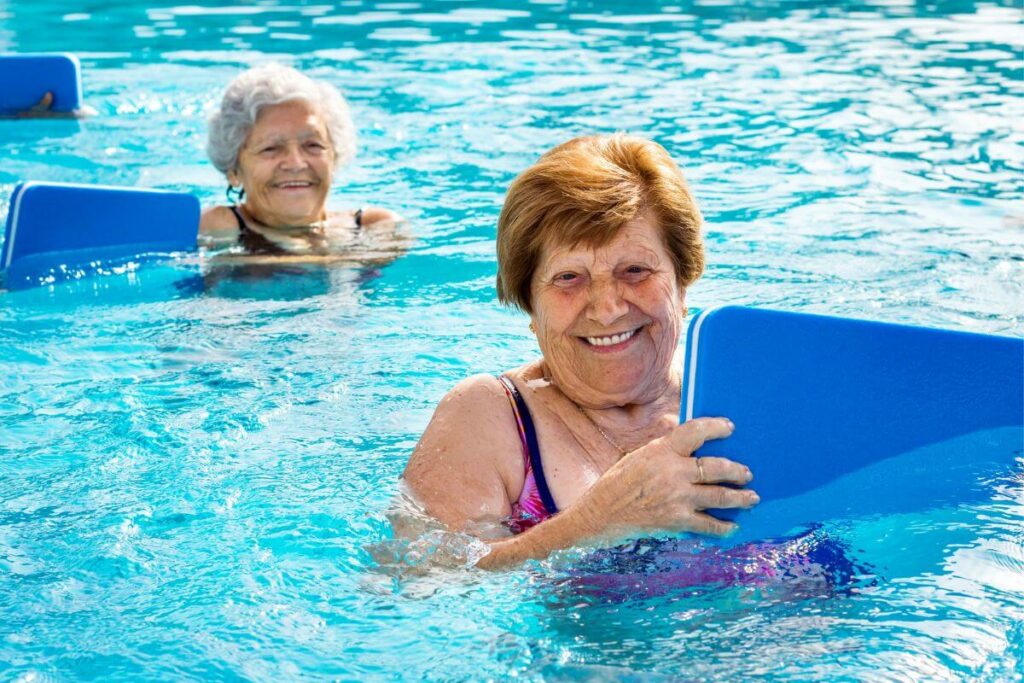
10 Benefits of Swimming for Seniors
1. Improved Muscle Strength
For older adults, maintaining muscle strength is crucial for daily activities and overall mobility. Swimming provides a full-body workout, engaging various muscle groups simultaneously. The resistance of the water helps seniors tone and build stronger muscles without putting excessive strain on joints, promoting functional strength and flexibility.
2. Joint Pain Relief
Joint pain is a common concern for seniors, often limiting their engagement in physical activities. The buoyancy of water reduces the impact on joints, making swimming a low-impact exercise that eases joint pain. This makes it an ideal option for those looking to stay active while minimizing discomfort and strain on sensitive joints.
3. Improved Heart Health
Swimming is an excellent form of aerobic exercise, promoting cardiovascular health in older adults. The rhythmic nature of swimming enhances blood circulation, improves heart function, and helps regulate blood pressure. Regular sessions in the water contribute significantly to a healthier heart rate, reducing the risk of cardiovascular diseases.
4. Full Body Workout
Unlike some exercises that target specific muscle groups, swimming offers a comprehensive full-body workout. It engages the muscles in the legs, core, and upper body, promoting balanced muscle development. This holistic approach to fitness contributes to an overall improvement in strength and stamina.
5. Reduced Stress Levels
The soothing environment of a local pool and the rhythmic nature of swimming can have a profound impact on stress levels. Seniors who incorporate swimming into their routine often experience reduced stress and anxiety, promoting mental well-being. The therapeutic benefits of swimming extend beyond physical fitness, positively impacting the quality of life.

6. Better Balance and Coordination
As individuals age, maintaining balance becomes crucial to prevent falls and injuries. An Australian study even suggested that swimming and aqua exercise help improve balance by enhancing coordination. The resistance provided by water forces seniors to stabilize themselves, contributing to better balance both in and out of the pool.
7. Enhanced Brain Function
Engaging in water-based exercises has been linked to improved cognitive function in older adults. The combination of physical activity, relaxation, and the sensory experience of water positively influences brain health. Swimming can potentially contribute to better memory, focus, and overall cognitive abilities. Thus, everyday tasks become easier.
8. Lower Risk of Falls
Seniors are often at risk of falls, which can lead to severe consequences. Swimming, with its emphasis on balance, coordination, and muscle strength, helps reduce the risk of falls. The low-impact nature of aquatic exercise makes it a safe and effective way for older adults to stay active without compromising their safety.
9. More Active Lifestyle
Swimming encourages an active lifestyle by providing a fun and enjoyable way for older adults to stay fit. The social aspect of joining water aerobics classes or swimming clubs also adds a sense of community, making the exercise routine more engaging. This, in turn, contributes to a more active, social, and fulfilling lifestyle.
10. Improved Overall Health
The combination of improved muscle mass, bone mineral density, and maintenance of a healthy body weight makes swimming a cornerstone of overall health for seniors. With benefits extending to heart health, stress reduction, and enhanced cognitive function, swimming stands out as a holistic approach to promoting well-being in older adults.
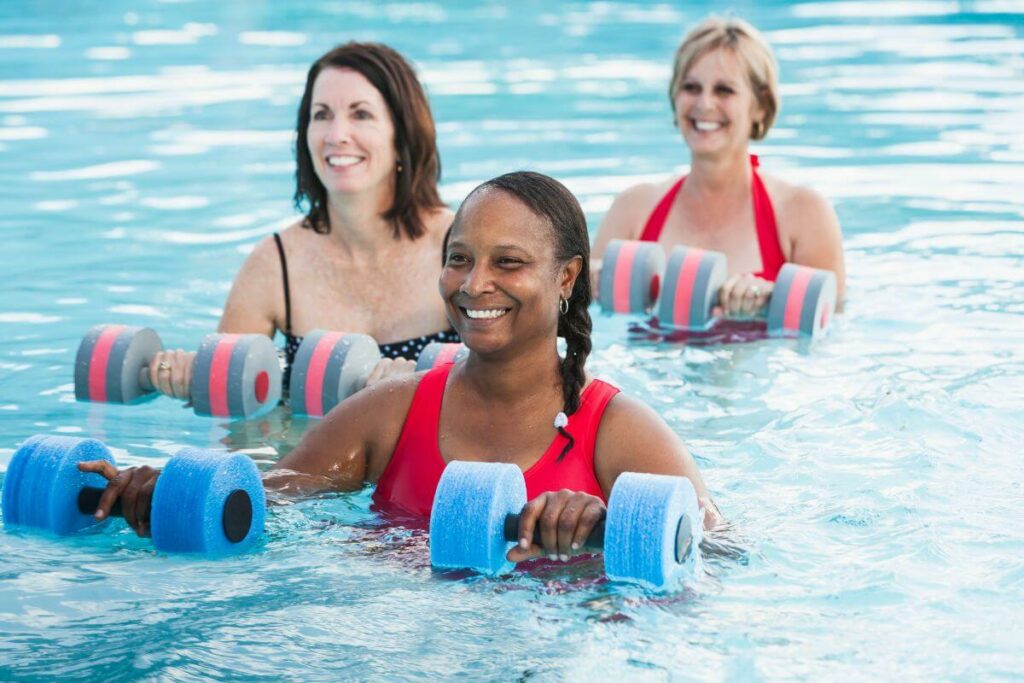
Aqua Exercises: Making Waves in Fitness
When it comes to senior fitness, aqua exercises present a compelling alternative to traditional land-based exercises. The buoyancy of the water acts as a natural cushion, significantly reducing the impact on joints, making it an ideal choice for older adults dealing with joint pain or arthritis. Engaging in water activities allows seniors to work major muscle groups with low impact exercises.
In addition to the gentle support water provides, water exercises offer an expansive range of motion. The water’s buoyancy and resistance allow for smoother movements, enabling seniors to stretch and extend with greater ease. This not only enhances flexibility but also mitigates stiffness and risk of injury, addressing common challenges faced by older individuals..
Aqua exercises shine in delivering a comprehensive, total body workout. Whether it’s water walking, swimming laps, or participating in water exercise classes, seniors can enjoy the benefits of engaging their entire body. The resistance offered by the water demands constant effort, leading to improved muscle strength and endurance. This holistic approach to fitness is particularly advantageous for older adults aiming to maintain overall health and well-being.
Beyond the physical advantages, aqua exercises foster a sense of community engagement. Often taking place at the community pool, a water-based exercise activity provides social interaction and a supportive environment. Water exercise classes, such as aqua aerobics or aqua yoga, not only offer a place for fitness but also become an opportunity for seniors to connect, share experiences, and build relationships. This social aspect contributes many mental health benefits to the lives of senior citizens.
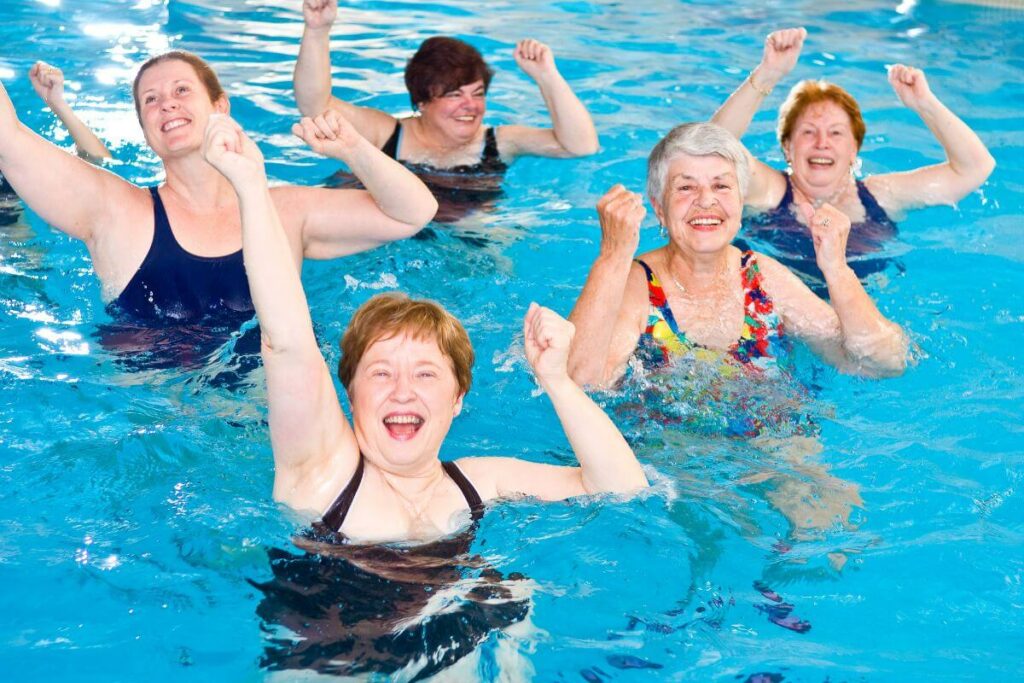
Types of Aqua Exercises and Swimming
Remember as a child in swim lessons, you learned how to do the breaststroke, butterfly stroke, backstroke, sidestroke, and freestyle? Seniors can feel free to do whatever kind of swimming they enjoy in the safety of a pool. But be sure to practice first and know what you’re getting yourself into before you go in deep water.
You can also do aqua yoga classes to help with balance and aqua aerobics or zumba classes to help with cardio and lung capacity. These classes, plus a variety of others, are often offered by your local Department of Parks and Recreation or your retirement community.
And finally, for a pleasurable and fun time in the pool, you can do the following exercises without much training:
- Aqua Walking
- Aqua Jogging
- Aqua Leg Lifts
- Flutter Kicking
- Arm Curls
- Leg Lifts
- Standing Water Push Ups
- Jumping Jacks
If you suffer from some forms of arthritis, you may also be able to work with physical therapists who specialize in aqua therapy. They will teach you even more kinds of exercises you can do in the pool.
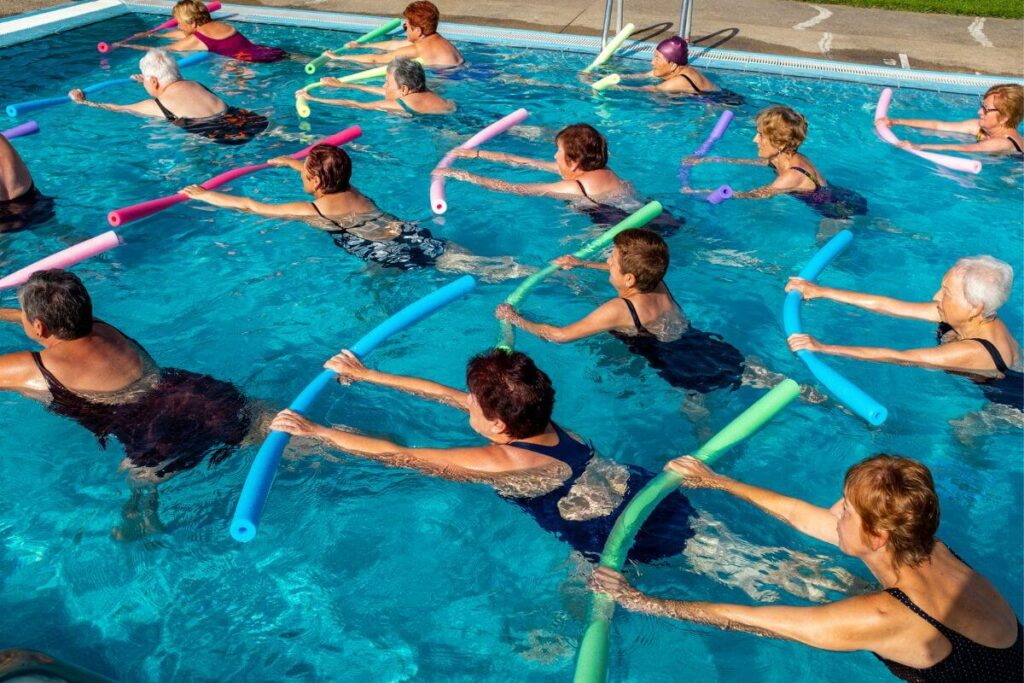
Final Thoughts about the Benefits of Swimming for Seniors
In conclusion, the many forms of exercise that elderly people can do in the water provide numerous health benefits. Water activity provides a great way to lower blood pressure through regular exercise, strengthen core muscles in a safe setting, and get cardiovascular exercise while promoting social interactions.
People of all ages can reduce the risk of heart disease, reduce the risk of osteoporosis, reduce chronic pain, and improve mental and physical health through regular exercise in a fun setting.
You may enjoy reading about my journey about staying healthy after 60 and how I went to my local indoor warm-water adult pool 2-3 times a week for months as part of my efforts to improve my health. I had to stop due to several family emergencies, but I’m getting ready to start aqua physical therapy and aqua classes again in the next month. I’m very excited to get back at it!
And finally, you might enjoy this Related Article:
Health Benefits of Walking for Seniors and Aging Adults
Love to ALL! ~ Susan

